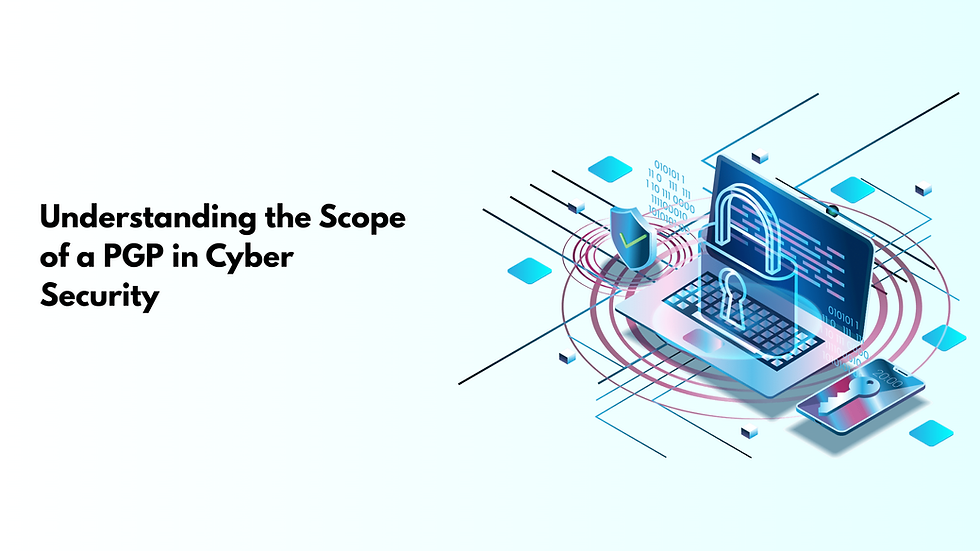Understanding the Scope of a PGP in Cyber Security
- Career Amend
- Aug 15, 2025
- 6 min read
Updated: Aug 16, 2025

Introduction
In today’s hyper-connected world, cyber threats are growing in both scale and sophistication. From ransomware attacks targeting small businesses to large-scale breaches affecting multinational corporations, the need for highly skilled cyber security professionals has never been greater. A PGP in Cyber Security (Post Graduate Program in Cyber Security) offers an advanced, industry-aligned curriculum designed to equip learners with both theoretical knowledge and hands-on expertise to tackle modern digital threats. It is not just a certification—it’s a comprehensive career accelerator that prepares individuals for diverse roles in the cyber security domain.
This blog explores the complete scope of a PGP in Cyber Security, covering its core objectives, career prospects, and the industry’s growing demand for such qualifications.
What is a PGP in Cyber Security?
A PGP in Cyber Security is an advanced, postgraduate-level training program that focuses on equipping learners with the skills necessary to secure networks, protect data, and mitigate risks in an increasingly digital world. Unlike short-term certifications, a Post Graduate Program in Cyber Security offers an in-depth understanding of various security domains—ranging from ethical hacking and penetration testing to compliance frameworks and cyber forensics.
While traditional IT courses cover the basics of networking and system management, a PGP in Cyber Security is designed with a specialized curriculum that addresses the rapidly evolving landscape of cyber threats. The program combines academic rigor with practical exposure, often featuring simulated attacks, live projects, and case studies that mirror real-world scenarios.
Core Objectives of a PGP in Cyber Security
The Post Graduate Program in Cyber Security has a clear set of objectives aimed at making students job-ready in one of the most critical fields of technology.
Key objectives include:
Enhancing Technical Expertise: Learners gain advanced skills in network defense, cryptography, malware analysis, and cloud security.
Developing Strategic Thinking: Beyond technical know-how, the program trains students to approach problems strategically, considering long-term security implications.
Industry-Ready Skill Development: Graduates emerge ready to take on complex cyber roles, having gained experience through practical labs, security tools, and penetration testing exercises.
These objectives ensure that graduates are not just certified but are genuinely capable of solving real-world cyber security challenges.
Key Subjects and Modules Covered
The curriculum of a PGP in Cyber Security is designed to be comprehensive, covering the full spectrum of security domains. The exact modules may vary between institutions, but common subjects include:
Network Security & Ethical Hacking – Understanding vulnerabilities in networks and simulating attacks to strengthen defenses.
Cyber Forensics & Incident Response – Learning how to investigate breaches, collect digital evidence, and restore affected systems.
Cloud and Application Security – Protecting cloud infrastructures and securing web/mobile applications against threats.
Compliance, Governance, and Risk Management – Familiarizing students with laws, policies, and frameworks such as GDPR, HIPAA, and ISO 27001.
Security Operations & Monitoring – Using Security Information and Event Management (SIEM) tools to detect and respond to threats in real-time.
These modules ensure a balance between offensive and defensive security skills, making graduates versatile professionals.
Industry Demand for Cyber Security Professionals
The demand for cyber security experts is not just high—it is skyrocketing. According to global industry reports, there is a projected shortage of millions of skilled cyber security professionals worldwide. Organizations across banking, healthcare, government, and technology are investing heavily in security measures to protect sensitive information.
A PGP in Cyber Security directly addresses this skills gap by producing professionals trained in both the technical and strategic aspects of the field. With cybercrime costs expected to reach trillions globally, the career stability and growth potential for those holding a Post Graduate Program in Cyber Security qualification is extremely promising.
Career Opportunities and Job Roles
Graduates of a PGP in Cyber Security can explore a wide range of job roles across different industries. Some of the most in-demand positions include:
Cyber Security Analyst – Monitors networks, detects vulnerabilities, and responds to threats.
Security Consultant – Advises organizations on best practices and strategies for safeguarding data.
Incident Response Specialist – Leads investigations during cyber incidents and coordinates recovery measures.
Cyber Forensics Expert – Specializes in uncovering digital evidence during cybercrime investigations.
Penetration Tester (Ethical Hacker) – Simulates attacks to test an organization’s defenses and recommends improvements.
Each of these roles offers competitive salaries, global mobility, and continuous learning opportunities.
Salary Scope and Earning Potential
One of the most appealing aspects of pursuing a PGP in Cyber Security is the earning potential. Cyber security professionals command premium salaries due to the specialized nature of their skills and the high stakes involved in protecting digital assets.
Average salary ranges:
Entry-Level: $60,000 – $80,000 annually (varies by region)
Mid-Level: $90,000 – $120,000 annually
Senior-Level / Specialized Roles: $130,000+ annually
Factors influencing salary include years of experience, area of specialization (e.g., cloud security, threat intelligence), and certifications earned alongside the Post Graduate Program in Cyber Security.
Global vs. Local Scope of a PGP in Cyber Security
One of the advantages of pursuing a PGP in Cyber Security is its relevance across international borders. Cyber threats are not confined to one country; they are a global challenge, meaning skills acquired in this field are transferable worldwide.
Global Scope: Countries like the USA, UK, Canada, Australia, and Singapore have a high demand for cyber security experts. International job roles often come with better pay packages and access to cutting-edge security tools.
Local Scope: In developing economies, digital transformation is accelerating, making organizations more vulnerable to attacks. This has increased demand for professionals who have completed a Post Graduate Program in Cyber Security, particularly in sectors such as fintech, government services, e-commerce, and healthcare.
Who Should Pursue a PGP in Cyber Security?
A PGP in Cyber Security is designed for a wide range of learners, from IT professionals to those looking for a complete career shift.
Ideal candidates include:
IT Professionals – Seeking specialization in security to move into higher-paying, niche roles.
Fresh Graduates – Especially those from computer science, IT, or electronics backgrounds aiming to enter a high-demand industry.
Career Switchers – Professionals from non-IT fields like finance or law who want to specialize in cyber risk management.
Entrepreneurs & Business Owners – Those who want to secure their business operations from potential threats.
Benefits of a PGP in Cyber Security
Choosing a Post Graduate Program in Cyber Security comes with multiple advantages that extend beyond just learning technical skills.
Major benefits include:
Hands-On Learning: Exposure to simulated cyber attacks, real-time monitoring tools, and penetration testing projects.
Industry Recognition: Many programs are backed by global security organizations, enhancing your employability.
Networking Opportunities: Connect with industry experts, peers, and recruiters during workshops and seminars.
Versatility: Skills gained are applicable across banking, IT, healthcare, defense, and more.
Challenges and Limitations
While a PGP in Cyber Security offers excellent career prospects, it’s important to be aware of certain challenges:
Continuous Learning Required: Cyber threats evolve constantly, requiring professionals to stay updated.
High Responsibility: Mistakes can have serious consequences, especially when securing critical infrastructure.
Fast-Changing Technology: Tools and methods may become outdated quickly, demanding adaptability.
Being aware of these challenges ensures you’re prepared for the demands of the profession.
Future of Cyber Security and PGP Relevance
The future of cyber security is intertwined with emerging technologies such as Artificial Intelligence (AI), Machine Learning (ML), and Blockchain. A Post Graduate Program in Cyber Security ensures you’re ready to tackle next-generation threats.
Key future trends include:
AI-Driven Threat Detection: Using automation to predict and mitigate attacks before they occur.
Zero-Trust Security Models: Shifting from perimeter-based defenses to continuous verification approaches.
Cyber Laws Expansion: Governments worldwide introducing stricter data protection regulations.
The skills gained from a PGP in Cyber Security will remain relevant for years as organizations prepare for increasingly sophisticated threats.
Conclusion
The scope of a PGP in Cyber Security is vast, offering opportunities across industries and geographies. It combines in-depth technical learning with strategic thinking, preparing graduates for roles that directly impact the safety and resilience of organizations.
Whether you are a fresh graduate or an experienced professional, enrolling in a Post Graduate Program in Cyber Security can open doors to high-paying roles, global career opportunities, and a future-proof profession in one of the fastest-growing sectors in the world.
Upskill Yourself with Our Trending Programs
FAQs
Q1: Is a PGP in Cyber Security worth it?
Yes. The increasing frequency and complexity of cyber attacks make cyber security professionals highly sought after. A PGP in Cyber Security equips you with both the technical and strategic skills to meet industry demands.
Q2: How long does the program take to complete?
Typically, a Post Graduate Program in Cyber Security can be completed in 6 to 12 months, depending on the institute and learning mode (full-time or part-time).
Q3: Can I pursue it without prior IT experience?
Yes, many programs start with foundational IT concepts, making them accessible to motivated learners from non-IT backgrounds. However, having basic computer and networking knowledge is beneficial.
Q4: Which industries hire PGP-certified professionals?
Banking, finance, healthcare, IT services, government agencies, and e-commerce companies actively hire cyber security specialists.
Q5: What is the average salary after completing a PGP in Cyber Security?
Entry-level professionals can expect salaries between $60,000 and $80,000 annually, with experienced experts earning well over $120,000.
.png)






Comments